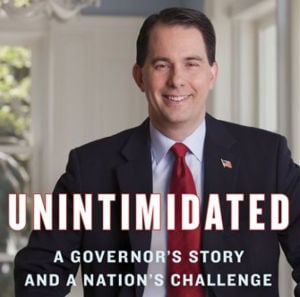In 2011, Wisconsin Governor Scott Walker signed Act 10, a law effectively ending collective bargaining among teachers unions there. It gave rise to massive protests, recall elections, teacher strikes and Democratic State Senators abandoning their posts during the bill's passage. Today, the Wisconsin Supreme Court ruled 5-2 to uphold Act 10 in it's entirety, effectively ending the fight that began three years ago.
Wisconsin Supreme Court upholds 2011 union lawMADISON, Wis. (AP) — The Wisconsin Supreme Court on Thursday upheld the 2011 law that effectively ended collective bargaining for most public workers, sparked massive protests and led to Republican Gov. Scott Walker's recall election and rise to national prominence.
The 5-2 ruling upholds the signature policy achievement of Walker in its entirety and is a major victory for the potential 2016 GOP presidential candidate, who is seeking re-election this year.
The ruling also marks the end of the three-year legal fight over the union rights law, which prohibits public worker unions from collectively bargaining for anything beyond base wage increases based on inflation. A federal appeals court twice upheld the law as constitutional.
"No matter the limitations or 'burdens' a legislative enactment places on the collective bargaining process, collective bargaining remains a creation of legislative grace and not constitutional obligation," Justice Michael Gableman wrote for the majority.
The high court ruled in a lawsuit filed by the Madison teachers union and a union representing Milwaukee public workers. They had argued that the law, which came to be known as Act 10, violated workers' constitutional rights to free assembly and equal protection.
The law also requires public employees to contribute more toward their health insurance and pension costs. In a two-sentence statement Walker issued Thursday, he praised the ruling and claimed the law has saved taxpayers more than $3 billion — mostly attributable to schools and local governments saving more money because of the higher contributions.
"Today's ruling is a victory for those hard-working taxpayers," Walker said.




 Oh wait they don't. They can lobby the government, but that is a separate issue altogether.
Oh wait they don't. They can lobby the government, but that is a separate issue altogether.
